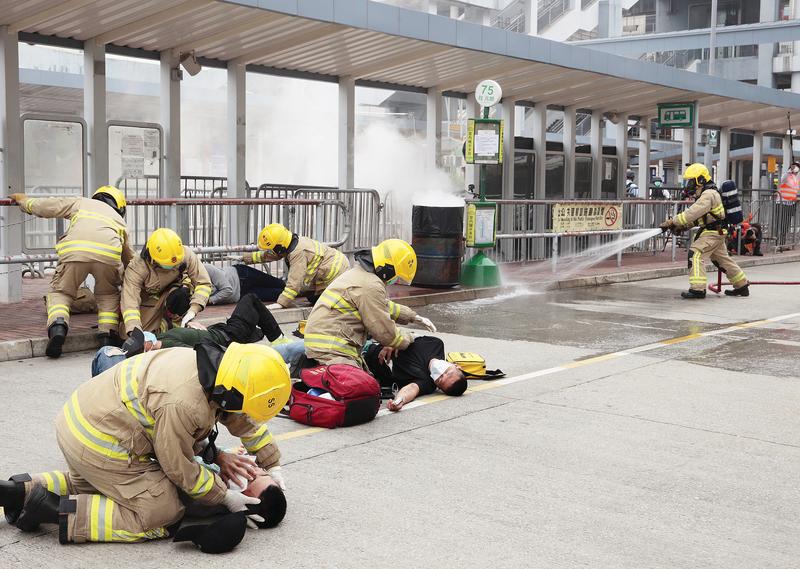 Officers at the Inter-departmental Counter Terrorism Unit train in first aid and extinguishing fires in a simulated bomb attack during a counterterrorism drill on Friday at the Lok Ma Chau Spur Line Control Point. (PHOTO PROVIDED TO CHINA DAILY)
Officers at the Inter-departmental Counter Terrorism Unit train in first aid and extinguishing fires in a simulated bomb attack during a counterterrorism drill on Friday at the Lok Ma Chau Spur Line Control Point. (PHOTO PROVIDED TO CHINA DAILY)
Hong Kong police carried out an interdepartmental drill on bomb attacks on Friday, as part of the force’s strengthened efforts to contain the city’s rising homegrown terrorism.
As concerns mount about local terrorism after recent seizures of homemade bombs and explosives commonly used by terrorists worldwide, the police have also been considering invoking a rarely used law on terrorism that would allow heavier penalties for stronger deterrence.
If the suspects were found to be launching the attacks for political ends, penalties could be increased by charging them under the anti-terrorism legislation
Lawrence Ma Yan-kwok,
chairman, Hong Kong Legal Exchange Foundation
More than 250 officers from the police force, fire services department, customs and immigration took part in the drill at Lok Ma Chau Spur Line Control Point — a check point between Hong Kong and Shenzhen.
The exercise simulated an explosion at a public transport interchange and a suspected bomb attack at the departure hall.
The city has seen an increasing number of incidents involving homemade bombs near the boundary.
There have been at least four bomb plots in two weeks between late January and early February, including one at Shenzhen Bay checkpoint and another at the Lo Wu railway station.
The police arrested 17 people on March 8 in relation to these incidents in citywide raids during which they seized 2.6 tons of explosive chemicals. Some of them were charged with conspiring to cause an explosion likely to endanger lives or cause serious damage to property.
The police force is also considering deterring such acts with anti-terrorism legislation. Earlier, Police Commissioner Chris Tang Ping-keung said police and the Department of Justice were studying the possibility of prosecuting these extremists under the United Nations (Anti-Terrorism Measures) Ordinance.
This would be the first such prosecution under the ordinance in Hong Kong since it was introduced in the city in 2002.
Hong Kong’s legal experts agreed that the legislation could be an effective way to deter such terrorism-like acts.
Barrister Lawrence Ma Yan-kwok, chairman of the Hong Kong Legal Exchange Foundation, told China Daily that if the suspects were found to be launching the attacks for political ends, penalties could be increased by charging them under the anti-terrorism legislation.
The suspects had claimed responsibility shortly after the bomb attacks and plots, threatening more such violent acts if the government doesn’t agree to their demand of a total shutdown of the city to curb the spread of the coronavirus.
Hong Kong has also recently seen a number of gasoline bomb attacks against police stations.
Song Sio-chong, professor at the Research Center of Hong Kong and Macao Basic Law at Shenzhen University, also said it was appropriate to charge people involved in such incidents under the anti-terrorism legislation.
Song said their actions, which are well-organized and could cause great danger to the public, are verging on terrorism. He urged police to take decisive action against such behavior.
Contact the writers at jefferygu@chinadailyhk.com


